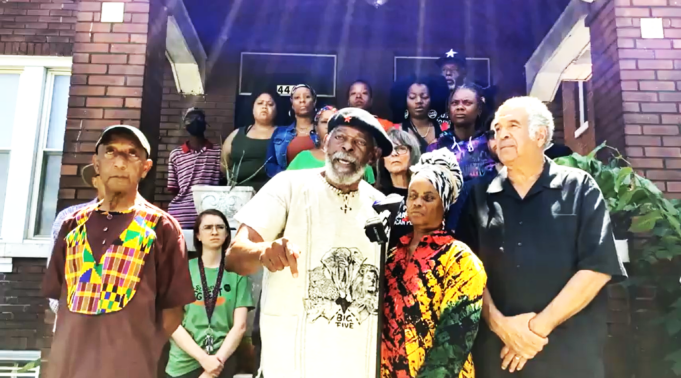‘We are going to appeal and we’re going to fight on’
by Janiah X
Contributing Writer
MIAMI—For at least two years, the U.S. government said the Uhuru Movement has been fighting for Russia. But during the federal trial in Tampa, Florida, prosecutors failed to prove the four defendants worked as agents of Russia.
The Department of Justice alleged Russians “recruited, funded and directed U.S. political groups to act as unregistered illegal agents of the Russian government and sow discord and spread pro-Russian propaganda.”
Omali Yeshitela, chairman of the Uhuru Movement and founder of the African People’s Socialist Party; two White allies, Penny Hess and Jesse Nevel, collectively are known as the Uhuru 3.

They were found not guilty by a jury Sept. 12 of “failure to register as a foreign agent” but guilty of “conspiring against the U.S. government.” The fourth defendant, Augustus C. Romain Jr., founder of the Black Hammer, came under the same fate.
Supporters call the trial “bogus.” They accuse the U.S. government of discarding the Uhuru Movement’s consistent message of Black liberation, and instead, placing it under a Russian-influenced umbrella, then sitting in a courtroom with no real evidence against them.
To supporters, the trial was an attack on free speech, an attempt to leash Black activists, and a reminder that efforts to shut down Black liberation movements remain alive and well today.
A week, faulty case with lack of evidence, supporters say
The trouble began in 2022 when F.B.I. agents raided properties belonging to the Uhuru Movement in St. Petersburg, Florida, and St. Louis, Missouri. “Uhuru” in Swahili means “freedom.”
The agents set off flashbang grenades during the pre-dawn raid and seized computer equipment and cell phones from members of the St. Louis chapter. Mr. Yeshitela and his wife were handcuffed while all of this went down.

All the while, the feds were building a case against them, alleging the pro-Black group was influenced by Russian intelligence to spread propaganda and influence U.S. elections. That same language was used in an indictment and press release from the U.S. Department of Justice.
On April 18, 2023, a federal grand jury in Tampa returned an indictment charging the four U.S. citizens and three Russian nationals with working for the Russian government and with the Russian Federal Security Service in a multi-year influence campaign in the U.S., the DOJ announced.
“We are not guilty of being Russian agents,” said Attorney Leonard Goodman, a member of the legal team representing the Uhuru 3. “We are going to appeal and we’re going to fight on.”
Among the charges, the DOJ says the Russians used the Uhuru Movement to “create the appearance of American popular support for Russia’s annexation of territories in Ukraine.” Prosecutors said the Uhuru 3 acted under Russian direction to stage protests in 2016 claiming Black people have been victims of genocide in the U.S.
But Zaki Baruti, president of the St. Louis-based Universal African People’s Organization, says demonstrations accusing the U.S. of genocide are nothing new for the Uhuru Movement.
“Historically, the African People’s Socialist Party has always taken a position around reparations, as well as how the United States government has treated Black people historically,” Mr. Baruti said.
“They’ve been targeted because of their ongoing criticism of the United States foreign policy as it relates to the Ukraine and Russia war. The right to free speech, where we should have the right to criticize the government expenditures for a war that we may not be in agreement with, especially in light of the fact that we are taxpayers.”
Shortly following Russia’s invasion of Ukraine, Mr. Yeshitela spoke out, with the African People’s Socialist Party defining the issue “as Russia’s defensive war against world colonial powers,” according to Handsoffuhuru.org.
In March 2022, Mr. Yeshitela held a news conference in which he said the “African People’s Socialist Party calls for unity with Russia in its defensive war in Ukraine against the world colonial powers.”
“There was agreement that there were some shared interests,” said Kamm Howard. Mr. Howard is the executive director of Reparations United based in Chicago. “The chairman stated that Russia has its interests, we have our interests, and if they want to collectively work on behalf of Black liberation, then you know, we can partner with them, but certainly not at their direction and control.”
The Uhuru Movement, born out of the African People’s Socialist Party, was founded in 1972 by Mr. Yeshitela. The movement has a 50-year track record of fighting for the freedom and unification of African people around the world.

Community supporters and fellow activists who could attest to this maintained a strong presence inside the courtroom throughout the trial. And they say the government had nothing on them.
“[Mr. Yeshitela] has been here for 50 years in this community,” said Atty. Goodman following the verdict. “They couldn’t find one person to say, yeah, that person, he’s not really for the Black people, he is for Russia, not one person.”
Most of the government’s witnesses were FBI agents. Mr. Baruti says he witnessed the prosecution’s lack of evidence with his own eyes.
“A lot of it was based on hearsay,” he said. “The defense was asking if the actions taken by the Uhuru 3, was that any way a danger to the United States’ security? And each time the agent had to answer no.”
Mwezi Odom is chairperson of the “Hands Off Uhuru” campaign. Ms. Odom says the evidence used against the Uhuru 3 included videos of Mr. Yeshitela’s speeches, which turned out to be in their favor.
“The government had nothing but fabricated stories and lies,” Ms. Odom said. “The FBI had to really search deep to try to find witnesses who could testify that we were Russian agents and it was clear that they had nobody. …
This is what the FBI tried to use as evidence against us, which only further made clear who we are agents of, and it is agents of working for Africa and African people, and that we’ve never needed anyone foreign to the African experience to tell us that we are owed reparations or to tell us that we have a right to fight for our liberation.”
An effort to silence Black groups, control dissent?
Considering the Uhuru Movement’s 50-year record and the lack of evidence against them, supporters question what the real motive was behind the trial.
“This was a bogus set of charges against a long-standing Black revolutionary organization with ties to the 1960s and 70s Black power, revolutionary struggle, that has not relented,” Mr. Howard said. “I thought that these charges were brought to totally silence any voices that are speaking about Black liberation in this country.”
“It goes all the way back to the Honorable Marcus Mosiah Garvey being targeted for his movement in terms of speaking truth to power,” Mr. Baruti said. “It goes back to the targeting and the destruction of the Black Panther Party for its outspokenness on international affairs.
It goes back probably to the targeting of Malcolm X, who broadened the international struggle for Black folks. It’s a replay based on the fact that the United States government led by the Biden administration, does not want dissent, especially from the Black community, which they always want us just to stay with, quote, unquote, civil rights issues.”
As of late, cracking down on free speech and dissent has been front-page news, with the handling of college students demonstrating and setting up encampments on campuses in protest of the genocide in Gaza. Ms. Odom says this fragility in American society gave way to the prosecution of the Uhuru 3.
“This attack on the Uhuru 3, this attack on Chairman Omali Yeshitela is an attack on everyone’s right to free speech,” Ms. Odom said. “During this time when the system is so fragile and so shaky that it’s losing its ability to control the people, and people are seeing right through what is happening in the world that this was almost a last straw for them in terms of their ability to keep the people glued to this idea that we live in this so-called democracy.”
The fight is not over
While the Uhuru Movement and the defense team celebrate the verdict, there is still more work to be done.
“The count that we were found not guilty of, that had a 15-year maximum. And so that’s off the table,” explained Attorney Mutaqee Akbar. “The conspiracy count has a five-year maximum. So, we’re still looking at up to five years in federal prison. So, it’s still an important case we’re dealing with.”
Mr. Akbar says this charge is so rare, that there are no sentencing guidelines. The judge can sentence them anywhere from probation to five years.
“The fight doesn’t stop here, we will appeal this,” Mr. Akbar said. “As the chairman says, the party has always and consistently worked for the liberation of Black people, not Russians, not anybody else; we can’t be bought, we can’t be paid for, and we will continue to fight and continue to struggle. That’s been clear and that will continue to happen.”
The legal team is asking for supporters to write letters to the judge, explaining what the three members, the movement and the party mean to them and their community. They are also asking for the community to pack the courtroom for the sentencing, which does not yet have a date.
The movement says the trial—was just one aspect of the fight.
“We must continue to deepen this attack on the free speech rights for everyone,” Ms. Odom said. “And I want to say, we are winning.”













